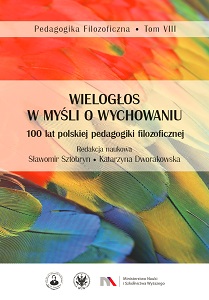Projekt antropagogii. Przesłanki filozofii wychowania Kotarbińskiego
The project of anthropagogy. Premises of Kotarbiński’s philosophy of education
Author(s): Sławomir Sztobryn
Subject(s): Philosophy, Education
Published by: Wydawnictwa Uniwersytetu Warszawskiego
Keywords: pedagogy; philosophy of education; Kotarbiński; anthropagogy
Summary/Abstract: The three areas that constitute specific vectors of T. Kotarbiński’s research in the field of philosophy of education are reism, praxeology and ethics. The concept of anthropagogy developed by him on this basis included the theory of effective and efficient action, acting in a real, concrete world with a clearly defined ethical model of a mature man. Anthropagogy for Kotarbiński was a way out of the traditional mode of education, usually narrowed down to a small age group and typical educational institutions, such as family, school and church. His anthropagogical ideas led him to oppose the past but historically long-standing tendency in our culture of encyclopedic education. He also wanted to pursue the classical, ancient ideal of education through art when he was creating his poetry. The philosophy of education that Kotarbiński propagated in his anthropagogy was heading in a diffrent direction than realizing any social ideology. His first concept was that of a reliable guardian, who could be any man building any social system. This was possible due to the specificity of his independent ethics, which included three areas that were of particular interest to Kotarbiński and that deepened the understanding of anthropagogy. These were: felicitology, praxeology and proper ethics, which he understood to be reflection on decent life. The philosophical foundation of anthropagogy consisted of, among others, atheism, materialistic ontology, determinism, analysis of principles of social development, understanding of history.
Book: Wielogłos w myśli o wychowaniu. 100 lat polskiej pedagogiki filozoficznej
- Page Range: 213-224
- Page Count: 12
- Publication Year: 2020
- Language: English, Polish
- Content File-PDF

